Wildlife 'at risk' as orchards are in 'poor condition'
- Published

Apple blossom blooms at Glastonbury Abbey
Campaigners say the range of wildlife in Somerset could be under threat because of the poor condition of the county's orchards.
A People's Trust for Endangered Species study found 61% were in a poor condition compared with 45% nationally.
The Orchard Ground Force group said traditional orchards were very good for the county's environment.
"These trees need maintaining and looking after to sustain the wonders that they bring," said Neil Macdonald of Orchard Ground Force.
"The real benefit of these orchards is that an apple tree decays quite quickly.
"An average age of a traditional orchard would be no more than 80 years old before those trees really start to rot down.
"It's in that rotting process that we get all the bugs and insects and all this massive amount of bio-diversity that we're getting in these orchards."
Rare insects
Natural England said many orchards were badly maintained as there were no economic reasons to look after them.
"The orchard owners [find it] generally hard to sell the fruit for a profit," said spokesman Chris Wedge.
"The trees might not be chopped down but they won't be looked after while they are alive and when they do die and fall over, then they're not being replaced.
"Orchards are really good for wildlife with lots of rare insects, plants, birds and mammals.
"As well as the wildlife, it's also from the landscape point of view. Especially in counties such as Somerset which are famous for their orchards."
Nationally 35,000 orchards were inspected during the People's Trust for Endangered Species study, with 2,700 of those orchards in Somerset.
Chemicals and pesticides
Orchards officer Steve Oram said the trust used aerial photographs and old plans to draw up the results, with some volunteers inspecting the trees.
"Obviously there are a lot of orchards in Somerset but there are a lot less then there used to be," he said.
"Only 10% were actually in excellent condition.
"You've got to have have ongoing management and trees being planted and I think that's where a lot of them have fallen over.
"They are beautiful orchards with big old cider apple trees - but there is no replanting.
"Essentially any orchard that has got a load of 60 or 70-year-old trees but no young trees, is destined to be gone in another 40 or 50 years."
Traditional orchards are classed as groups of fruit and nut trees which are managed in a low intensity way, with extensive management and little or no use of chemicals and pesticides.
Intensive orchard are groups of fruit trees which are crammed together in smaller spaces and are intensively managed.
- Published5 May 2011